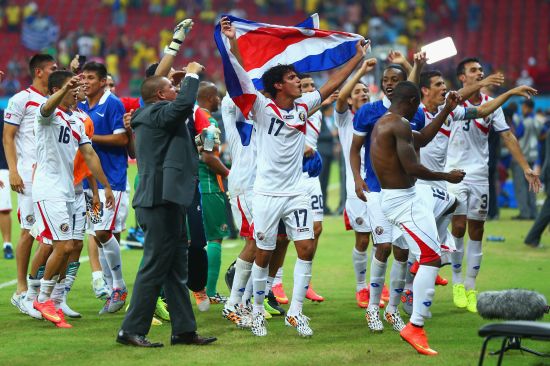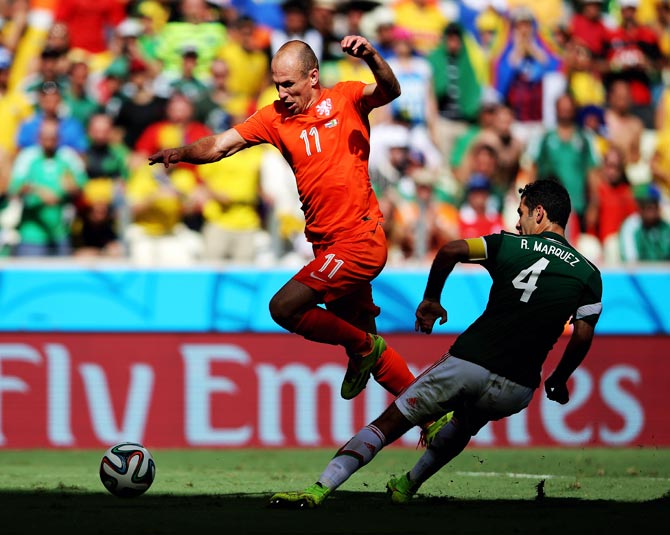 | « Back to article | Print this article |
5 life lessons from the World Cup
The most celebrated sporting event also has a lot of lessons for you to learn from.
The World Cup in Brazil has been an undoubted spectacle.
With goals flying in from every angle, jaw-dropping saves being executed, giants falling from grace and newer stars emerging, few could have asked for anything more of the greatest show on earth.
But is there more to these events than meets the eye?
Does the World Cup in any way, ignite ideas relevant to those in the white-collar world?
Could it kindle insights, which could help one cope with business challenges at hand?
How do the stories unfolding on the pitch, relate back to one's own issues at the workplace?
American poet and philosopher Henry David Thoreau once mused, 'it is not about what you look at, it is about what you see'.
Perhaps it is time to take stock of the World Cup so far, with that perspective in mind.
For when one begins to seek meaning in even our entertaining experiences, truly interesting learning is around the corner.
Vinay Kanchan is a trainer in the art of creative thinking and a brand ideation consultant. He is also the author of the book The Madness Starts at 9 and can be contacted at vinaykanchan5@gmail.com.
Please click NEXT to continue reading...

1. Never underestimate the underdog
Tiny Costa Rica has been the story of the World Cup so far.
Slotted in the 'group of death', with three past world champions to fend off, the prospect of them qualifying for the next round (let alone topping the group), were as remote as Halley’s Comet making an appearance over the earth this month.
But perhaps those exceedingly grounded expectations, served to liberate the team, and drive them to perform way beyond themselves.
Even in the business world, it pays to heed the underdog.
Usually such companies are ever willing to be brave and adventurous.
Just like their counterparts from the sporting field, they know they have to work that much harder, to be on a level playing field with the leaders.
Sometimes this is precisely how they manage to steal a march.
Many years ago, Avis trying to take on Hertz, in the car rental business in the US, actually openly celebrated this rigour in the ethic of the underdog.
Their iconic 'we are No 2, so we try harder' campaign, not only showcased an endearing underdog perspective on things to customers, but also succeeded in driving the company significantly forward.
Please click NEXT to continue reading...
2. Life is difficult at the top
Spain was one of the favourites for the tournament this year.
The defending World and European champions were in the midst of the biggest purple patch in their nation's soccer history. Or so it seemed.
In a mere two games, Spain saw the purple colour of their plot take on a distinctly red hue.
They were one of the first teams to be knocked out of the competition.
Organisations at the very top of their domain need to always appreciate, the precariousness of their position.
Their predicament is perhaps captured by paraphrasing Lewis Caroll’s famous quote, 'they have to run twice as fast, to stay in the same place'.
Once strong competitive advantages, soon cease to be so.
Just like the others got wise to Spain's 'tiki taka' style, and developed counter measures.
Leaders, who were previously primarily responsible for getting things going, might be in the later stages of their career.
Akin to Spain's famed midfield which seemed jaded this time.
Environmental conditions, in which the business is conducted, could have been transformed to their detriment.
Similar to how the humidity in Brazil could have impacted the quick tempo and Spanish passing the game.
IBM lost ground to Microsoft, as the premier technology company in the world, because software became the driving force of the industry.
A host of public sector companies in India found their shares eaten away by private players post liberalisation, which suddenly increased consumers expectations of service.
The corporate world also shows us that change is an inevitably imminent process, especially at the top.
Please click NEXT to continue reading...
3. Behind adversity lurks opportunity
Football has this wonderful capacity of showing us, how things can be quickly turned around.
How potential tragedies can be flipped into unexpected successes.
Nothing illustrated the see-saw nature of the game better, than the last minute of the match between Ecuador and Switzerland.
Ecuador pushing for a late winner lost the ball to the alert Swiss, who had the ambition to go to the other end and score, thus landing a few important points for their cause.
Apparently the Chinese word for 'crisis' is made up of two parts, one which spells 'danger' and the other which reads 'opportunity'.
This dual perspective on any difficult situation can always serve the corporate world well. Frequently in the events that make up a crisis, there lie the clues of how it can be overcome.
An optimistic mindset and an ability to look beyond the obvious, is sometimes all that is needed.
While examples of this abound in the business domain, one of the stories going around Hindi cinema makes an emphatic point along these lines.
During the shooting of Kagaaz Ke Phool, Guru Dutt, its director, discovered a hole in the roof of the sets.
As attempts were being made to patch it up, he decided to exploit the beam of sunlight which was creeping through.
He used it almost like a metaphorical barrier between the two leading actors -- to create Waqt Ne Kiya, one of the most compellingly shot songs from Indian cinema.
Indeed, turning a problem around can truly be a blockbuster experience.
Please click NEXT to continue reading...
4. Old can still uncover gold
The World Cup is the very theatre of athleticism.
Players perform at breathtaking speed.
Their fitness levels are immense.
The stamina demands on them are colossal. And then there is the heat.
Brazil would appear to be no country for old men, at least on the soccer pitch.
But vintage performers have their way of making an impact.
The exploits of the inspirational captains and defenders -- Mario Yepes (Colombia) and Rafael Marquez (Mexico), and the silky Italian playmaker Andrea Pirlo show us that age does not necessarily diminish the scope and influence of a valuable resource.
And herein lie pertinent lessons for the corporate world.
Sometimes employees get to hear inane things like, 'you are too old for the post now', or 'we only believe in hiring young blood in this company', even 'this assignment needs a lot of energy'.
Age, should always be looked at as only a chronological benchmark.
If the person has the required skills to fulfil the role in question, such objections should be summarily cleared out of the penalty box.
Age and experience usher in a depth of knowledge and a width of perspective.
These are invaluable assets for any organisation, which can seldom be readily downloaded from any website.
Many organisations already have these 'reservoirs of know-how' present within, lying untapped.
In fact India has had a long tradition, in cherishing the wisdom of elders.
The courts of kings used to always have at least one aged and wise person, whose opinion was always sought on key issues.
Perhaps it is time to reinstate our very own 'Bhishma Pitamah' equivalents, in modern-day offices.
Please click NEXT to continue reading...
5. All it takes is one moment
When Brazil took on Mexico at Fortaleza, one man stood between them and victory -- the Mexican goal keeper Guillermo Ochoa.
Released by his club AC Ajaccio, Ochoa’s future seemed uncertain before the match began.
But his near-impossible save of a towering Neymar header, changed all that.
In a mere few minutes post the match, the previously unknown Ochoa, was the hottest trending topic on Twitter.
And now he is a much sought-after player, on the European Club circuit.
That moment of sublime skill had helped him rewrite his resume.
Many moons ago, the CEO of the SAS Group Jan Carlzon, had coined the term 'moments of truth'.
This spoke of how every time a customer interacts with a company, its perception either goes up or down.
It essentially dwelt on the importance of every moment, at every interface point, which the company had with the customer.
But this is very true at an individual level as well.
Human perception is a flexibly-adept thing at most times.
We are given the opportunity to change our perception for the more favourable, nearly every single day at the office.
A brilliantly put together presentation to the client, a moment of crisis handled with poise, an opportunity to have a one on one with the boss, the chance to train people within the company.
Modern-day corporate life, is like a benevolent guardian angel -- it gives us chances aplenty to shine.
We just need to look at every moment from that illuminating viewpoint.
Eventually the World Cup might ostensibly be about a glorious celebration of the 'beautiful game'.
But if you are willing to strain your mind’s eye, just a touch more, it could provide some invaluable food for thought, for your daily challenges at work, and your future career.
For in the game of life, we all have our very own goals to score. These management lessons from the World Cup might help you score.





